Syria war: Thousands flee Turkish assault on Afrin enclave
- Published
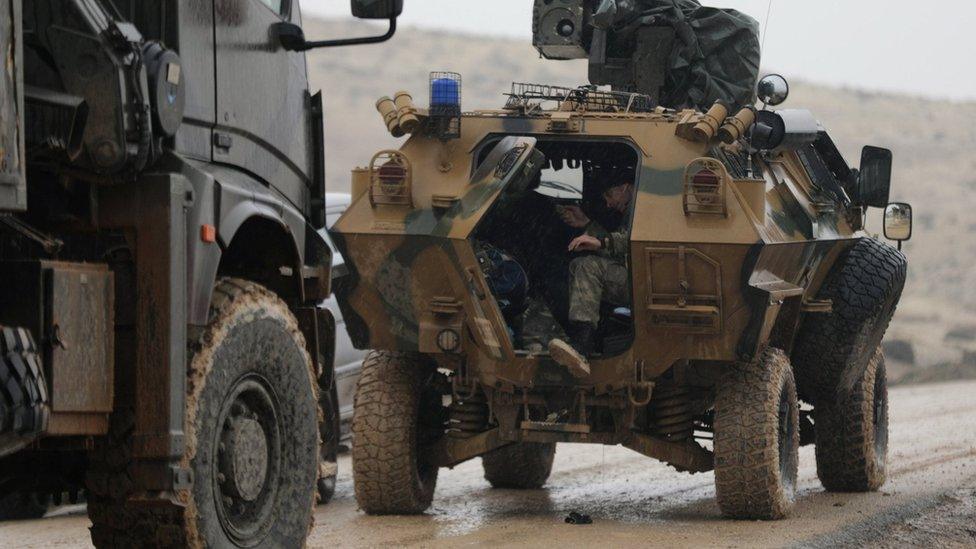
Turkish troops and allied Syrian rebels so far appear to have made limited gains
An estimated 5,000 people have been displaced by clashes between Turkish-led forces and Kurdish fighters in north-western Syria, the UN says.
The civilians have fled communities near the border since Turkey launched an offensive to drive a Kurdish militia out of the Afrin region on Saturday.
Some are reported to have been prevented from crossing into territory controlled by the Syrian government.
The UN said it was ready to deliver aid to 50,000 people in Afrin if required.
World powers involved in the Syrian conflict meanwhile called on the Turkish military to exercise restraint because it risked exacerbating the country's humanitarian crisis.
Turkey's president has vowed to "crush" the People's Protection Units (YPG) militia, which controls Afrin and more than 400km (250 miles) of Syria's northern border.

He says it is an extension of the banned Kurdistan Workers' Party (PKK), which has fought for Kurdish autonomy in south-eastern Turkey for three decades.
The YPG denies any direct organisational links to the PKK - an assertion backed by the US, which has provided the militia and allied Arab fighters with weapons and air support to help them battle the jihadist group Islamic State (IS) in Syria.
What is happening on the ground?
Turkish troops and allied Syrian rebels so far appear to have made limited gains since the air and ground offensive began on Saturday.
On Tuesday, the Turkish state-run Anadolu news agency reported that rebels had captured the "strategic" village of Hammam in north-western Afrin, and had begun allowing civilians to return to eight already "liberated" villages and rural areas.
Presidential spokesman: Nato "not paying enough attention" to Turkish concerns
It also reported that a second Turkish soldier had been killed in clashes.
YPG sources told the Kurdish Hawar news agency that its fighters had foiled an attempt to seize the village of Qastal Jando, killing many attackers, and destroyed an armoured vehicle in Qoda.
Kurdish leaders also invited civilians to take up arms, saying the YPG was "ready to receive all those who wish to defend Afrin and provide them with weapons".
Where are displaced civilians going?
The UN says it is deeply concerned by the fighting, and has warned that an estimated 323,000 civilians in Afrin are at risk. About 126,000 of them had already been displaced before this Turkish offensive and now face further upheaval.
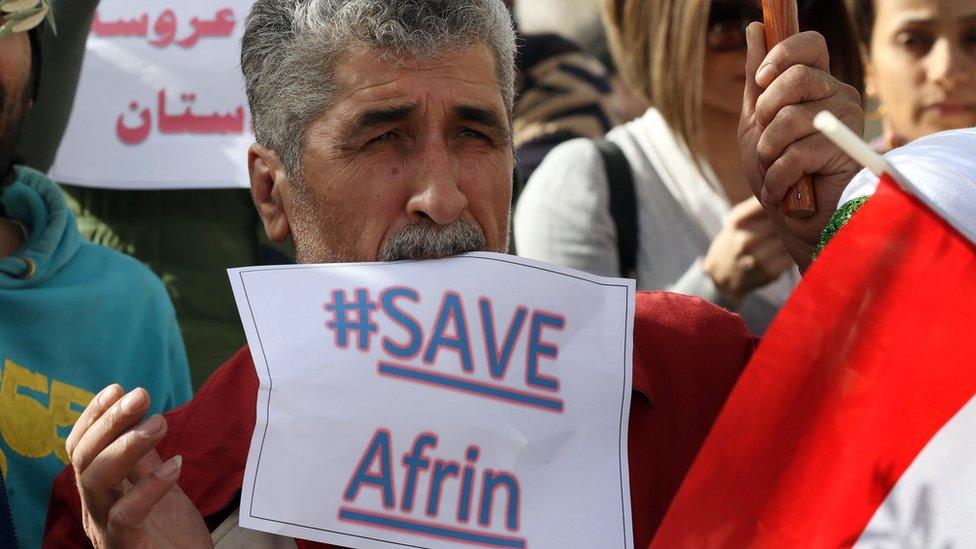
Iraqi Kurds protested against the Turkish assault in the city of Irbil on Tuesday
A UN report issued on Tuesday afternoon, external cited local sources as reporting that as of Monday, an estimated 5,000 people from the border communities of Bulbul, Shankal, Admanli, Balal Kuy and Ali Bakki had fled to central parts of Afrin.
The UN warned that their freedom of movement was restricted not only by the hostilities, but also by the local Kurdish authorities' decision on Saturday to close exit points between the enclave and government-held areas of Aleppo province.
Some families had managed to leave Afrin through unofficial routes, but were reportedly prevented from proceeding at government checkpoints, it added.
"We have been preparing for a large scale response depending on the needs of the civilian population," spokesman Stéphane Dujarric told reporters. "We cannot stress enough the need for all parties involved to protect civilians, to protect civilian infrastructure, and to respect international law."
How many people have died?
Neither side has released much information about fatalities, making the death toll difficult to gauge.
The Syrian Observatory for Human Rights, a UK-based monitoring group, reports that 25 Syrian rebels and 26 Kurdish fighters have been killed so far.
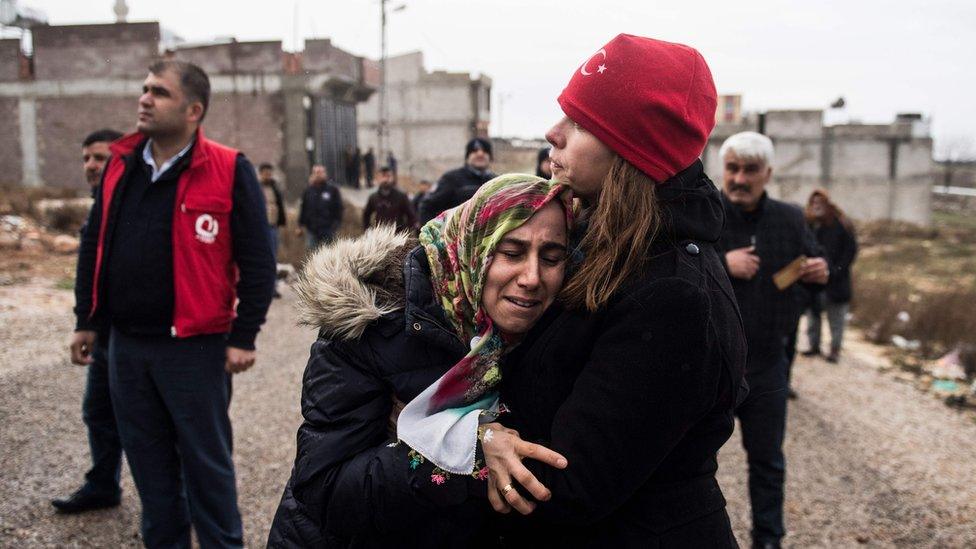
Civilians living in southern Turkey are reported to have been killed by Kurdish rocket fire
It also says 24 civilians have been killed - 22 in Turkish air and artillery strikes, and two as a result of Kurdish fire.
Turkey has denied killing civilians, saying it only targets combatants.
What is the background to the offensive?
Turkish President Recep Tayyip Erdogan ordered the assault on Afrin - dubbed "Operation Olive Branch" - not long after news reports said the US had begun helping the YPG form a "border security force".
Why is Turkey attacking Syria? Mark Lowen explains
Turkey's prime minister said it wanted a 30km-deep (19-mile) "safe zone" along its border inside Syria, which would encompass most of the Afrin enclave.
About 10,000 Syrian rebels are reportedly taking part in the offensive, while Turkish officials estimate that there are between 8,000 and 10,000 YPG fighters in Afrin.
How have key powers reacted?
On Tuesday, US Defence Secretary Jim Mattis said he took "very seriously Turkey's legitimate security concerns", but urged it to "exercise restraint in the military action and the rhetoric".
Russian President Vladimir Putin and his Turkish counterpart Recep Tayyip Erdogan discussed the issue by phone, the Kremlin said. Both sides agreed that Syria's territorial integrity and sovereignty should be respected.
Russia - an ally of the Syrian government - had earlier withdrawn military observers from Afrin and effectively allowed Turkish warplanes to fly over the enclave.
Politicians in Germany, meanwhile, reacted angrily to Turkey's use of German-made Leopard tanks. The chairman of the parliamentary foreign affairs committee said Germany should not carry out a planned upgrade of the tanks for its Nato ally.
- Published23 January 2018
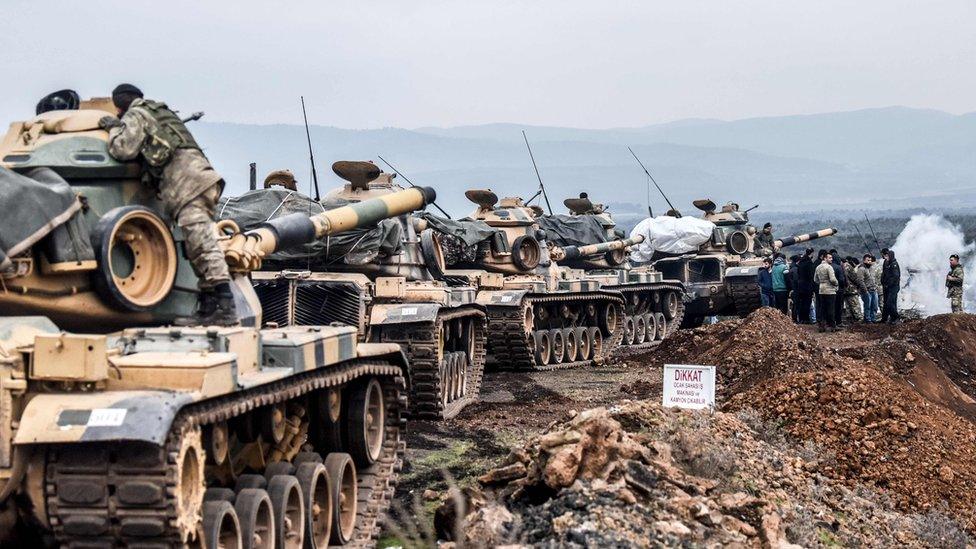
- Published22 January 2018
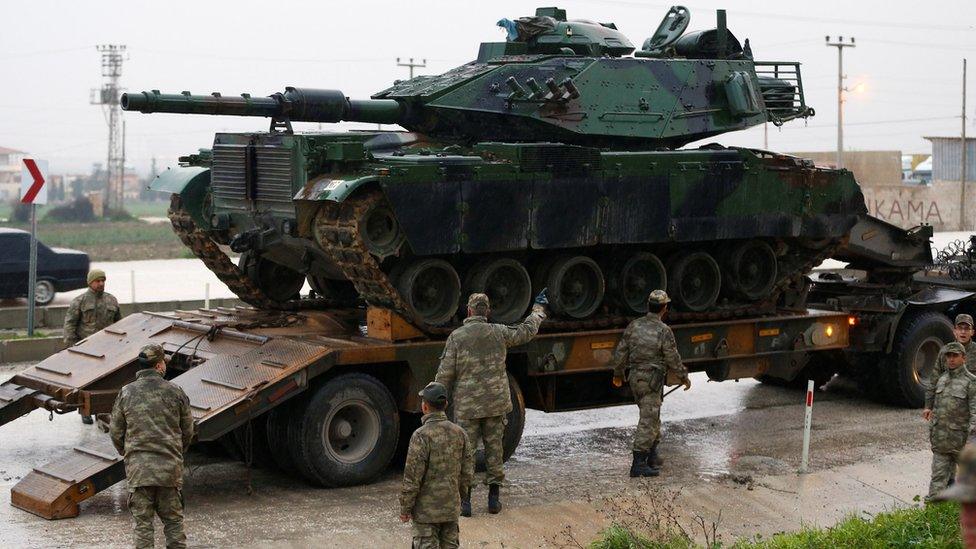
- Published20 January 2018
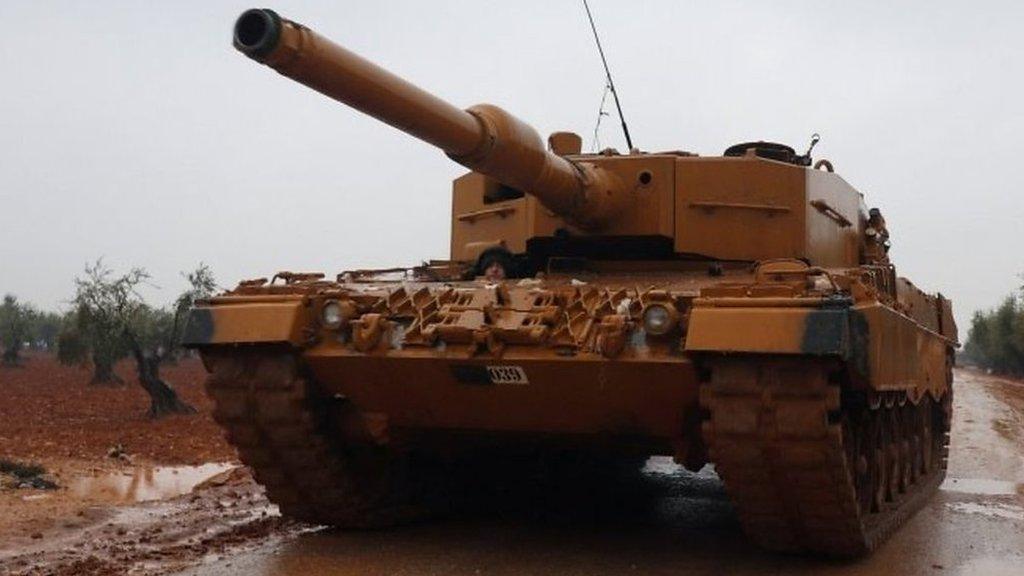
- Published28 March 2018
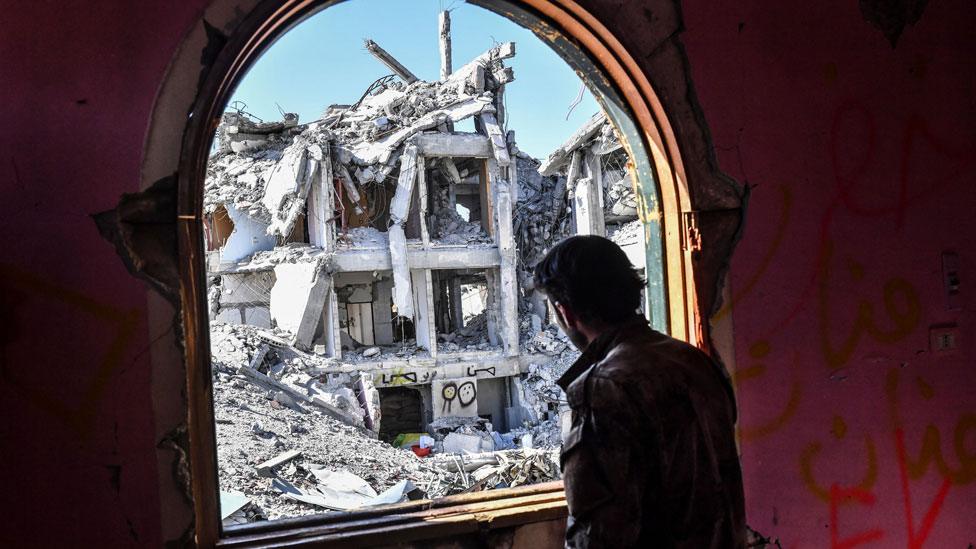
- Published15 October 2019
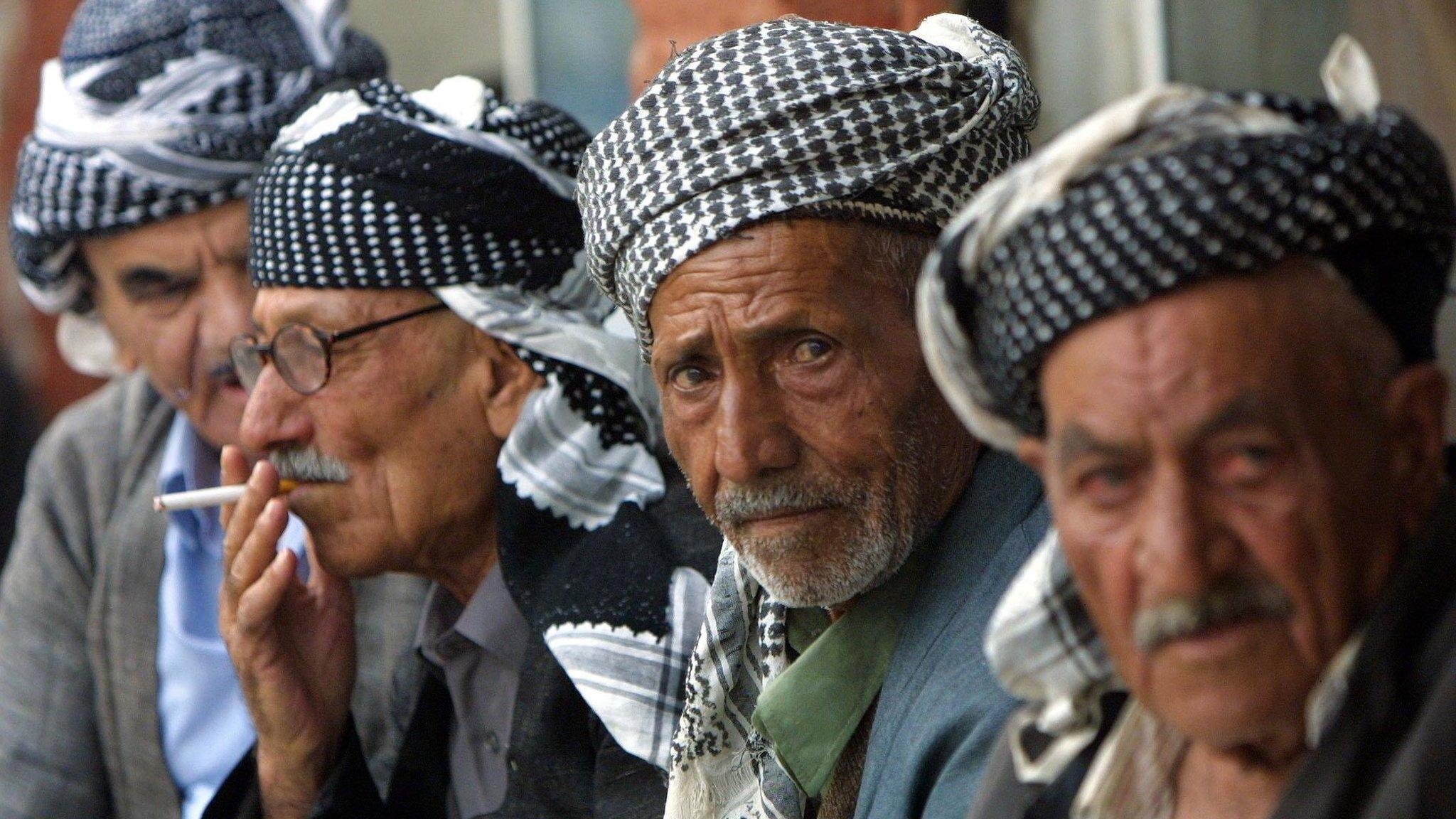
- Published2 May 2023
